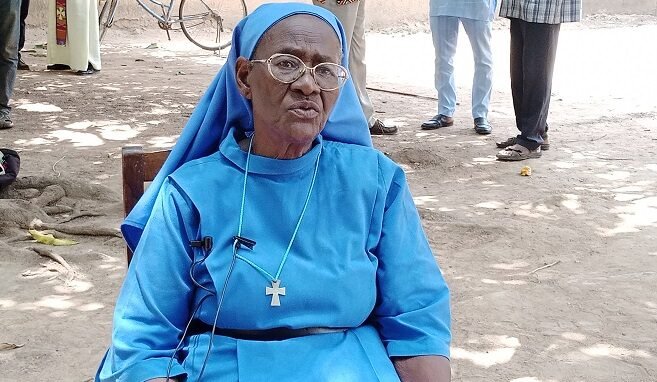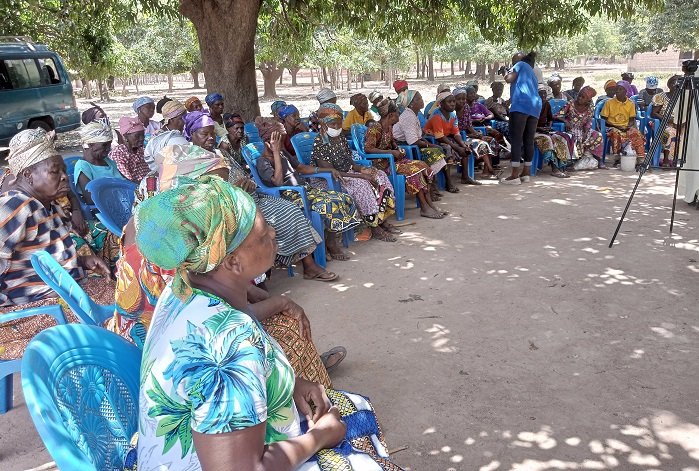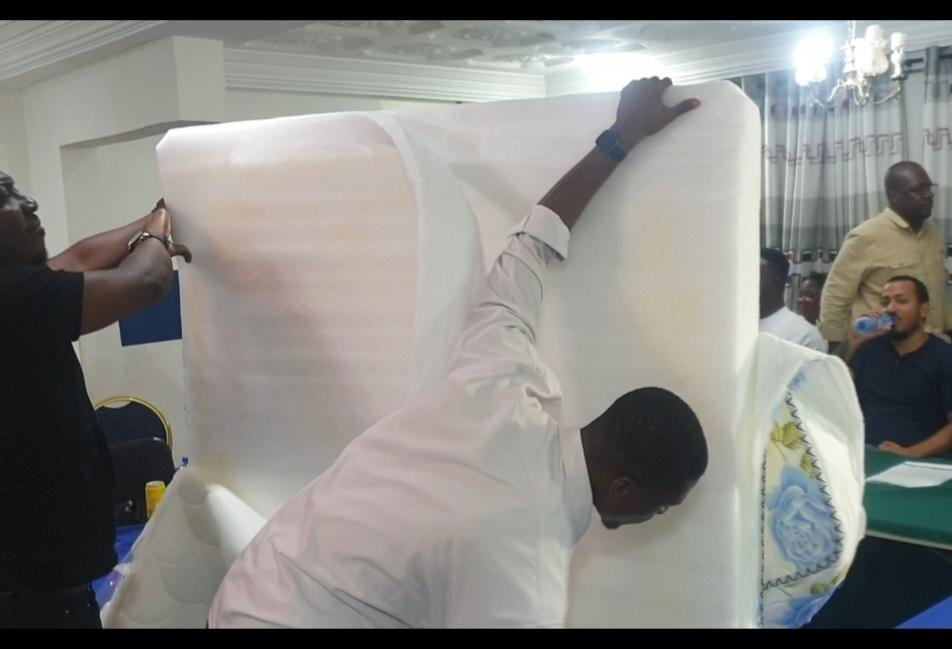News
Reverend Sister forms association to support widows

Just like Dorcas in the Bible who organised widows and orphans and provided for them, a Catholic Sister in the Dafiiama-Bussie-Issah District in the Upper West Region, has taken it upon herself to organise and assist widows.
Reverend Sister Gabriel Nonaah of the Daffiama Parish, now an octogenarian (80 years and above) has been doing the benevolent work since 1990 and now has over 780 widows under her stewardship called the St Monica’s Widows Association.

Sister Nonaah told TheSpectator that she had the call in a dream to start the association when she came to terms with the suffering of widows in the area.
“From the stories they shared with me about the physical and emotional trauma they went through, I was touched and decided to help them with the little I can and that birthed the association in 1990,” she narrated.
She explained that she was unable to cater fully for the needs of the widows but supported them emotionally with soothing words that encouraged them to live decent lives.
She said she had to step in to educate some of them about some outmoded traditions when she first started the association.
Through sensitisation, the association has been able to save many of the widows from such practices and encouraged to be economically active.
“It has not been smooth sailing, we really have challenges because I cannot cater for 780 widows as you can see and many of them have dependent children and the number keeps adding on”, she said.
She explained that during the floods that occurred in the region last year which washed away young seedlings on people’s farms, many of the widows were affected and life became very unbearable for them.
She lamented that many of the widows were currently living in undesirable conditions and were mostly starved because they did not have any farm produce to depend on.
Sister Nonaah used the opportunity to call on benevolent institutions and individuals to come to their aid and support the women in whichever way possible either through skills training for the younger ones or support in petty trading.
“I am very old now, so I have started training a young lady to take over from me but she will still need the assistance of people to be able to help these women”, she said.
She mentioned Lawyer Thaddeus Sory, Managing partner at Sory@Law, a law firm in Accra as one of their regular donors who had made a point to make food donation in large quantities to them annually.
Some of the widows interacted with this reporter and shared harrowing experiences.
“I lost my husband six years ago and I have six children”, Madam Christy Kpianyanga, a widow narrated. She said her youngest child was seven years old and was not in school just because she could not provide for him in addition to the others.
She indicated that it was difficult providing three square meals a day particularly after last year’s floods where she lost her crops to the water.
Another widow, Afia Wadieh had four children when her husband died 10 years ago leaving them with no farmland to feed on. She was in a dilemma as she had no working capital either.
She was however grateful to the Association for the support it continued to provide since its inception.
From Lydia Darlington Fordjour, Wa
News
Watch your mattresses!…they can cause chronic back pain, other health disorders

Local mattress manufacturers have raised serious concerns over the influx of substandard mattresses, warning that these products pose significant health risks to consumers and threaten the sustainability of Ghana’s mattress industry.
At a press briefing held in Kumasi on Tuesday, manufacturers accused unregistered foreign entities, particularly Chinese firms, of flooding the market with cheap mattresses made from polystyrene.
Mr Yaw Ampem Darko, a spokesperson for the local manufacturers, warned that prolonged use of substandard mattresses, especially those made with polystyrene, could result in chronic back pain, musculoskeletal disorders, poor posture, and diminished sleep quality.
These health implications, they stressed, were not always immediately evident but accumulate over time, especially among vulnerable populations such as children and the elderly.
This material, typically used for packaging, is considered unsuitable and unsafe for bedding.
According to industry leaders, these sub-standard products have been circulating for at least five years, gaining traction among unsuspecting consumers due to their unusually low prices.
“These mattresses are being sold at suspiciously low prices, luring unsuspecting consumers who are unaware of the health dangers.”
“We are not just protecting our businesses; we are protecting Ghanaian lives. The government must act swiftly to stem this tide before more citizens fall victim to these dangerous products,” Mr Yaw Ampem Darko stated.
The Ghana Standards Authority (GSA) has acknowledged the issue and, in response, announced a nationwide enforcement campaign aimed at clamping down on the production, distribution, and sale of substandard mattresses.
The campaign, which was scheduled to take effect from September 30, 2025, was empowered by the GSA Act, 2022 (Act 1078), which authorises the Authority to seize and seal non-compliant products and impose sanctions on offenders.
In a statement signed by the Director General of the GSA, Professor George Agyei, the authority cited Sections 29 and 43 of the Act, reiterating that all mattresses sold in Ghana must meet established national standards or face confiscation.
The statement further emphasised that mattresses failing to meet these standards not only compromise sleep quality but also contribute to long-term health complications, including spinal and neck pain.
Despite the GSA’s commitment, manufacturers have expressed frustration over delays in implementation and called for stronger enforcement mechanisms.
They urged the GSA to work in close collaboration with the Customs Division of the Ghana Revenue Authority and national law enforcement agencies to identify and prosecute violators of Ghana’s quality standards.
Manufacturers are also appealing to consumers to remain vigilant and prioritise their health by verifying that any mattress they purchase bears the GSA certification mark.
Moreover, they caution the public against purchasing suspiciously cheap mattresses that lack proper labelling or identifiable branding, as these were often indicators of substandard or counterfeit products.
As the official enforcement deadline had expired with no show, the local producers insisted that much more than business interests were at stake.
They argued that without swift and sustained action, the health and safety of Ghanaian consumers would continue to be compromised.
“Public awareness, strict enforcement, and collaboration among regulatory bodies are essential if we are to protect the integrity of the local industry and the wellbeing of the Ghanaian people,” Mr Darko indicated.
From Kingsley E. Hope, Kumasi
Join our WhatsApp Channel now!
https://whatsapp.com/channel/0029VbBElzjInlqHhl1aTU27
News
Raissa Initiative demands harsher punishment for sexual abusers of girls

The Founder of the Raissa Child Protection Initiative, Ms Raissa Sambou, has urged authorities to impose severe punishment on individuals, including teachers and guardians, who sexually abuse young girls.
Speaking in an interview to mark this year’s International Day of the Girl Child (October 11), Ms Sambou condemned the increasing cases of sexual exploitation involving minors, describing such acts as “heartless, criminal, and a total betrayal of trust.”
She noted that those entrusted with the care and education of children must not be the same people who violate them, stressing that “anyone found guilty of abusing a girl child must face the full rigours of the law without leniency.”
The International Day of the Girl Child is observed annually to promote the rights of girls, empower them to reach their full potential, and draw attention to the challenges they face worldwide.
Ms Sambou lamented that poverty continues to push many young girls into vulnerable situations, exposing them to exploitation.
She expressed concern that some headmasters, teachers, and community members who should protect girls rather take advantage of them.
“This must stop immediately. The safety of every girl must never be compromised,” she said, urging the public to report all forms of abuse to the appropriate authorities and called for swift action by law enforcement agencies against perpetrators.
Addressing girls directly, Ms Sambou encouraged them to take their education seriously and to believe in their potential.
“It is possible to be young and responsible. Your future is bright, protect it, believe in it, and never let anyone dim your light,” she advised.
She further urged girls to choose their friends wisely, stay disciplined, and speak up if anyone makes sexual advances toward them.
Ms Sambou concluded with a rallying call for collective action, saying “speak up, protect them, and empower them. Together, we can end the sexual exploitation of girls.”
By Esinam Jemima Kuatsinu
Join our WhatsApp Channel now!
https://whatsapp.com/channel/0029VbBElzjInlqHhl1aTU27






